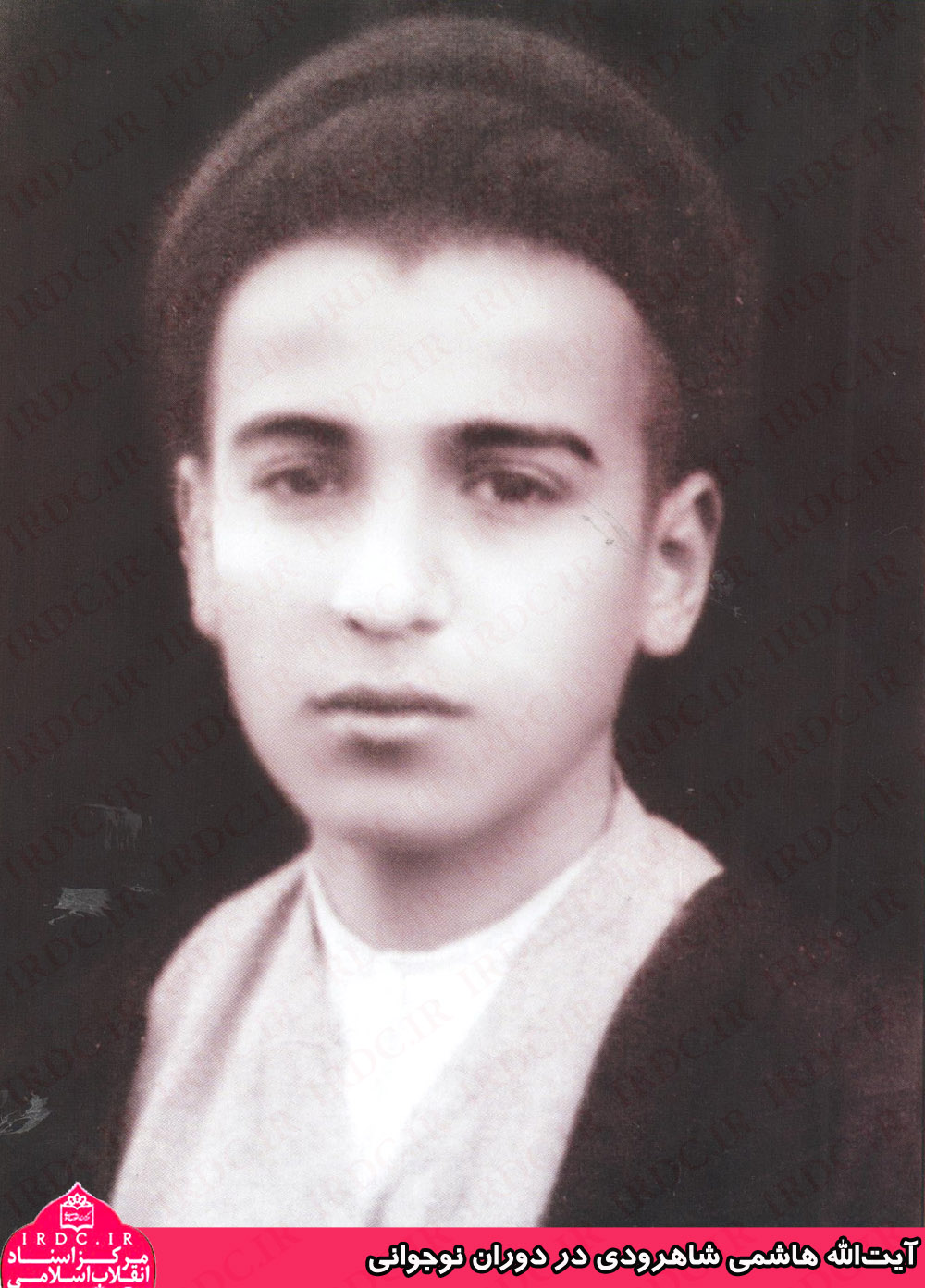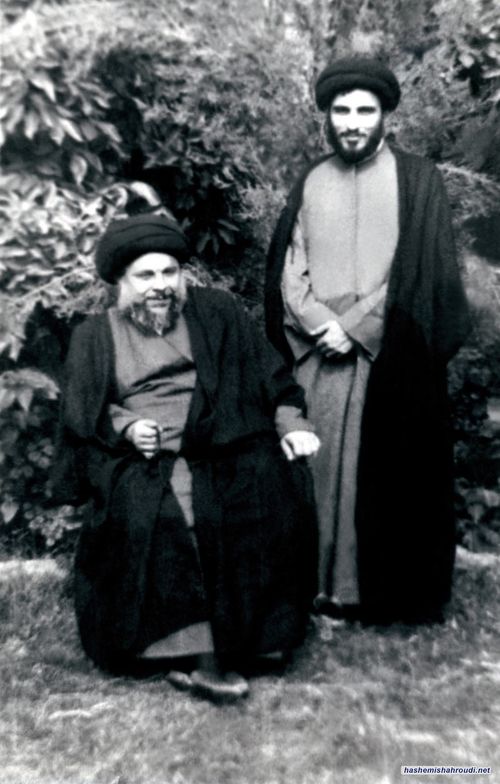Sayyid Mahmoud Hashemi Shahroudi who lost his father in childhood followed his father in his career and became one of the special students of Ayatollah Muhammad Baqir Sadr. It is said that his master had called him as a promising future for Islam and treasure for Sharia. Ayatollah Dr. Mostafa Mohaqiq Damad remembers that Shahid Sadr had said that Mahmoud Hashemi is akin to his son.
Ijtihadnetwork: Before the August 14th, 1999 in which he was appointed as the 4th chief justice of the judicial system of Islamic Republic of Iran, he was known as “Sayyid Mahmoud Hashemi” who was one of the young Mujtahids of Qom Seminary, a brilliant student of Ayatollah Muhammad Baqir al-Sadr, and also a member of the Faqihs (experts in Islamic law) of the Guardian Council of the Constitution. However, people in and outside of the country began to recognize him as “Ayatollah Hashemi Shahroudi” since Ayatollah Khamenei, as it is common in Qom seminaries, added the name of Hashemi`s birth place (Shahroud) in his deed of appointment.
He was born of Iranian parents at Najaf in 1948. His father, Sayyid Ali Hashemi, was one of the brilliant students of Grand Ayatollah Sayyid Abu-al-Qasim Khuei and passed away in his 40. It has been said that he was the first one who had written the taqrirs of Ayatollah Khuei`s lessons.  Sayyid Mahmoud who lost his father in childhood followed his father in his career and became one of the special students of Ayatollah Muhammad Baqir Sadr. It is said that his master had called him as a promising future for Islam and treasure for Sharia. Ayatollah Dr. Mostafa Mohaqiq Damad remembers that Shahid Sadr had said that Mahmoud Hashemi is akin to his son.
Sayyid Mahmoud who lost his father in childhood followed his father in his career and became one of the special students of Ayatollah Muhammad Baqir Sadr. It is said that his master had called him as a promising future for Islam and treasure for Sharia. Ayatollah Dr. Mostafa Mohaqiq Damad remembers that Shahid Sadr had said that Mahmoud Hashemi is akin to his son.

By the increase of the political tension between Iraqi Ba`ath government and the opposed seminarian of Najaf, the situation becomes more difficult for the students of Shahid Sadr. Although Sayyid Mahmoud Hashemi was not an active member of the underground “Da`wat-al-Islamiah” group, he had been sent to prison for several weeks. Finally on his master`s advice, he came to Iran from Kuwait in 1979. In Iran, he was also engaged in the activities against Saddam Hussein government. He established the Supreme Council for the Islamic Revolution in Iraq along with Ayatollah Sayyid Muhammad Baqir Hakim. Hashemi Shahroudi was the first chairman of this organization but after few months he delegated the authority to shahid al-Sadr. Due to these activities of Ayatollah Hashemi, his brothers were arrested and martyred in Iraq by Saddam Regime.
Since the beginning of the 1980s, his presence in political activities faded away because as he himself have said, Imam Khomeini had advised him to focus on Islamic teaching and research to become a theorist in the system of guardianship of Islamic jurist. The establishment of the “Institution of Islamic Jurisprudential Encyclopedia according to the religion of AhlulBayt (peace be upon them)” through the order of Ayatollah Khamenei at the beginning of his leadership is deemed the most important commission of Ayatollah Hashemi Sharoudi in Qom Seminary.

However, Ayatollah Hashemi`s avoidance of politic did not last long and after a decade of political silence, when Ayatollah Golpayegani and Ayatollah Araki passed away in 1993 and 1994 respectively, he pointed out the Marjaeiat of Ayatollah Khamenei and said it is expedient for Islam and Muslims and leads to the defeat of enemies and disbelievers. He was also appointed in place of Ayatollah Muhammadi Gilani to the Guardian Council of the Constitution on March 2, 1995. In this way, he entered the high up in the government of Iran. Ayatollah Khamenei in his deed of appointment called him “a discerning and scholar faqih”.
Nevertheless, Ayatollah Hashemi took a stand against Ayatollah Montazeri`s speech in November 1997. He described the Ayatollah Mantzeri`s words during his completed advanced training (darskharij) in the seminary as insulting, malicious and affront to the Leadership. In response to the controversial lecture of Ayatollah Montazeri, he stated that Ayatollah Khamenei is more knowledgeable than other Mujtahids. He emphasized, “Any doubt and skepticism towards the ijtihad of Ayatollah Khamenei is due to unawareness or spite or ill-will and would hurt Islam and the wishes that God have fulfilled after so many years that is the prophets, Ahlulbayts and Islamic experts` wish to establish an Islamic system in this country. Now how can an individual leave all these to follow his personal desires? After all, there is no doubt about the sheer Ijtihad of Ayatollah Khamenei.” Through this lecture, Ayatollah Hashemi Shahroudi mentioned the superiority of Ayatollah Khamenei over other Mujtahids in one hand and showed that two decades of his career in Qom Seminary has distanced him from Najaf seminary`s viewpoint, which revolved around jurisprudence principles only.
Ayatollah Hashemi Shahroudi like his master, shahid al-Sadr, introduced the “understanding of culture as well as intellectual and legal issues of the day” as a factor that is necessary for Alamiyat. He was following the Grand Ayatollah Borujerdi`s point of view according to which being aware of jurisprudential principles is not enough for the qualification of a Faqih. He said that for Ijtihad and Alamiyat, a faqih must have mastered the whole knowledge and traditions of Infallibles:
It is not correct that the one who has spent more time studying jurisprudence, writing a book or something like that is now an Aʻlam just because of these. This is wrong both from scholarly and morality viewpoint.
In 1999, Ayatollah Hashemi Sharoudi became a member of Assembly of Experts of the Leadership and on August 14 of the same year, he was appointed chief justice of the judicial system of Islamic Republic of Iran. After ten years that he was the chief justice, he went back to Qom and continued his completed advanced training (dars al-kharij) in the Qom Seminary. He published his jurisprudential point of view in 2010 and put his name on the list of Shia Marjaʻs. At the same time, he came back to the Guardian Council of the Constitution by Ayatollah Khamenei`s order and through his command, Hashemi Shahroudi was appointed the head of Supreme Council of Dispute Resolution and Regulation of Relation of Trinary Branches in 2011. His last position in Islamic Republic of Iran`s system was the chief of Expediency Discernment Council, which shows the grate trust of Ayatollah Khameni`s in him. In the other word, the trust in the Mujtahid who is the most significant speaker of shahid Sadr`s jurisprudential point of view.

Now his religious and political administration come to end while he passed away so soon that his administration could influence significantly in religious and political sphere. The last pictures taken of him in the Expediency Discernment Council is not similar to those of Ayatollah Hashemi Rafsanjani with so confident and laughter.
The end of the scholarly life of Ayatoolah Hashemi Shahroudi is a furthermost part of the incomplete path of shahid Sadr and his followers that is the fulfillment of Islamic wishes in social, political, and economical arena.
 Ijtihad Network Being Wise and Faithful Muslim in the Contemporary World
Ijtihad Network Being Wise and Faithful Muslim in the Contemporary World
